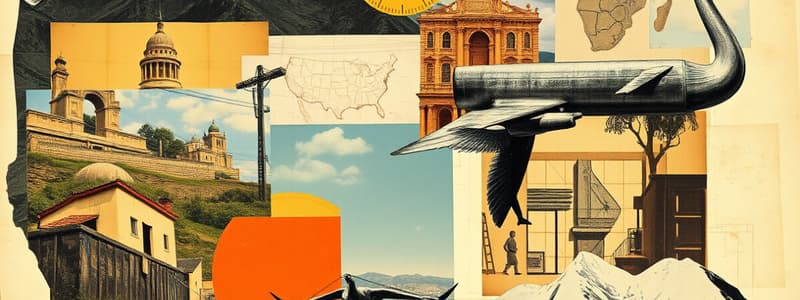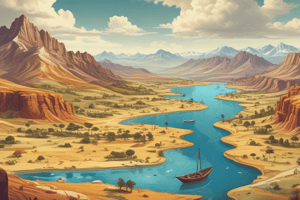Podcast
Questions and Answers
What does regional geography mean?
What does regional geography mean?
The study of the geography of regions and the interplay between physical and human geography, which results in an understanding of human society, its physical geographical underpinnings, and a sense of place.
What is the power of place?
What is the power of place?
The relative power a place has within the context of the nation as a whole, often evaluated through economic, political, and cultural dimensions.
What is sense of place?
What is sense of place?
The special and often intense feelings that people have for the region in which they live, derived from natural and cultural experiences.
Which of the following are Robert Bone's six regions in Canada? (Select all that apply)
Which of the following are Robert Bone's six regions in Canada? (Select all that apply)
List and explain the four faultlines.
List and explain the four faultlines.
What is the core-periphery model?
What is the core-periphery model?
List provinces in Canada.
List provinces in Canada.
List territories in Canada.
List territories in Canada.
List capitals of provinces and territories in Canada.
List capitals of provinces and territories in Canada.
What is a region?
What is a region?
What are the physical characteristics of a region?
What are the physical characteristics of a region?
What are the human characteristics of a region?
What are the human characteristics of a region?
What is a formal region?
What is a formal region?
What are functional regions?
What are functional regions?
What is a vernacular or perceptual region?
What is a vernacular or perceptual region?
Flashcards are hidden until you start studying
Study Notes
Regional Geography Overview
- Regional geography studies the interrelation between physical and human geography, enhancing understanding of societies and their environments.
- Focuses on human society's geographical underpinnings and emphasizes the significance of "sense of place."
Power of Place
- Refers to a place's relative influence within a national context, often associated with economic, political, and cultural dimensions.
- Dominant regions in a country, such as Canada, are known as "cores."
Sense of Place
- Represents the deep emotional connection individuals have to their regions, influenced by both natural and cultural experiences.
- Can be recognized at local, regional, and national levels, forming a vital bond between communities and their geography.
Robert Bone's Regions in Canada
- Identified six regions in Canada: Ontario, Quebec, British Columbia, Western Canada, Atlantic Canada, and Territorial North.
Regions and Characteristics
- Provinces: Include ten provinces such as British Columbia, Ontario, and Quebec.
- Territories: Consist of Yukon, Northwest Territories, and Nunavut.
- Capitals: Corresponding capitals include Victoria, Toronto, and Iqaluit among others.
Definition of Region
- A distinct area characterized by unique human and/or natural features.
- Boundaries can be transition zones with overlapping characteristics from adjacent regions, creating a unique regional identity.
Physical Characteristics of a Region
- Key aspects: geographic location, landforms, climate, soils, and natural vegetation.
Human Characteristics of a Region
- Include culture (language), economic bases, political identities, demographics, urbanization, and sense of place.
Types of Regions
- Formal Region: Defined by common characteristics; e.g., Quebec's French language dominance or British Columbia's Pacific climate.
- Functional Region: Based on activities connecting territories; e.g., commuter regions surrounding urban centers.
- Vernacular Region: Territory with residents sharing a strong sense of belonging and place.
Studying That Suits You
Use AI to generate personalized quizzes and flashcards to suit your learning preferences.



